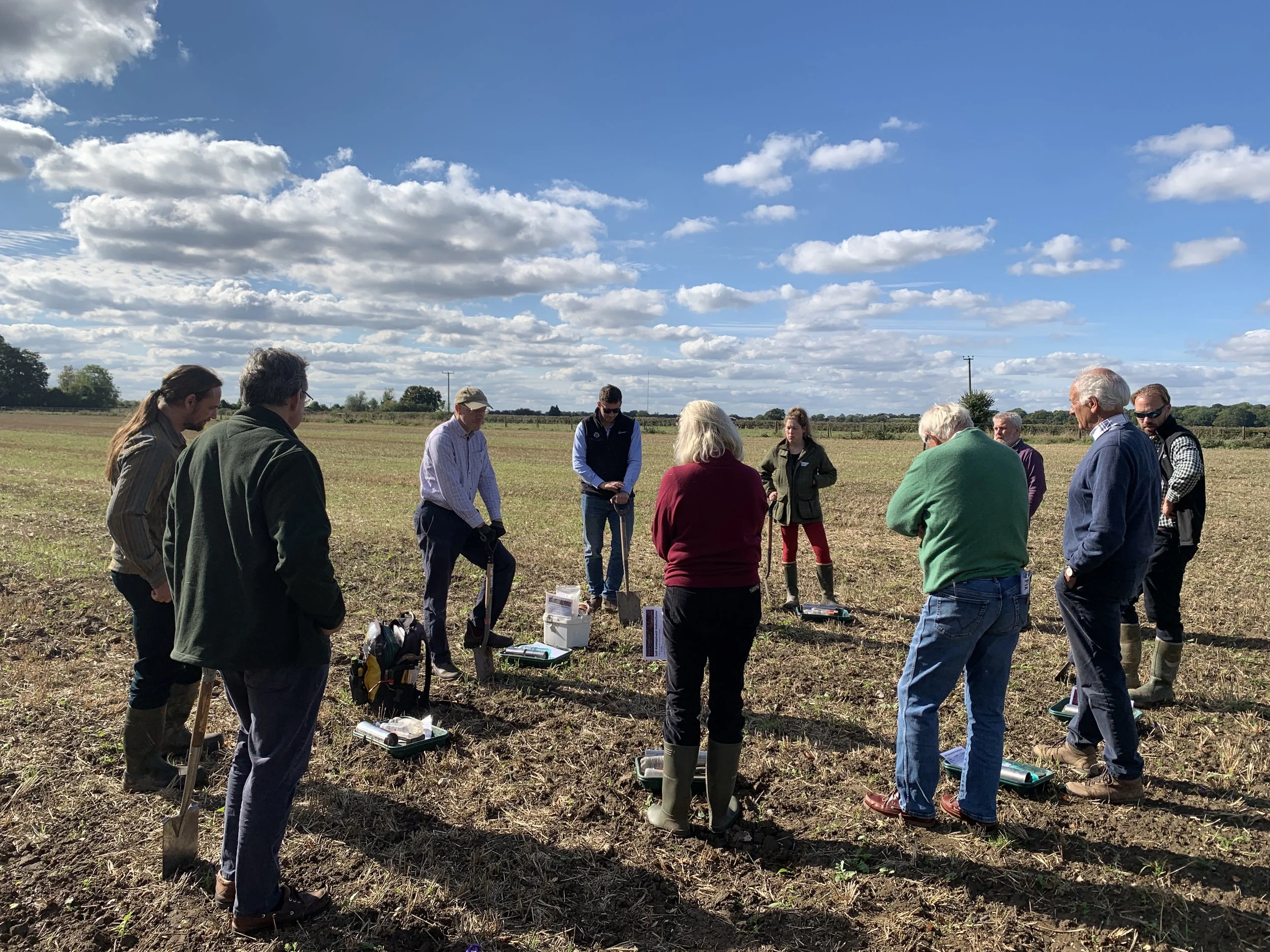
A community of farmers working across the Upper DebeN catchment and wider Mid-Suffolk area to bring greater benefits to wildlife, water and soil.
Upper Deben Farm Cluster is a group of 27 farms across 4000 hectares on the Freshwater Catchment of the River Deben in Suffolk. We exist for the purpose of enhancing our members' knowledge about how to become more sustainable, both environmentally and financially.
Our Environmental Aims are to improve our soil, water quality, biodiversity and water holding capacity across our farm landscapes at scale. Our farmer education events enable our members to successfully make Environmental Improvements to their farming systems, which, in turn, make our farms more resilient to both drought and extreme rainfall, both of which we have experienced more and more in recent years.
There are multiple benefits to all of our environmental aims, for example our focus on soil improvements will:
• Reduce soil and agri-nutrient run off into our rivers improving Water Quality
• Reduce flooding by enable our soil to retain much more water, in fact, every 1% increase of soil organic matter will help us to retain 350 cubic meters of rainfall per hectare of land
• Reduce greenhouse gas emissions by lowering inputs and covering and disturbing soil less
• Increase the carbon sequestered in our soils
• Increase our crop yields, by making the soil itself more resilient
what is a farm cluster?
Farmers and land managers do a lot for the rural environment, but there is only so much that an individual, acting in isolation, can achieve on their own. By working together, helped by an advisor or ‘facilitator’, farmers and land managers can work more cohesively together in their locality. This enables them to collectively deliver greater benefits for soil, water and wildlife at a landscape scale. There are lots of different approaches to landscape scale conservation, but farmer clusters are designed to start life at the farmer level, under the guidance of a lead farmer and a trusted conservation advisor. The work is often supplemented by existing agri-environment schemes.
The first farmer clusters were piloted by Natural England and the Game and Wildlife Conservation Trust (GWCT) in 2014. The aim was to bring farmers, land managers and conservationists together to deliver greater benefits for soil, water and wildlife at a landscape scale.
There are now farmer clusters all over the country, with new clusters being established all the time. Farmers do a lot for wildlife, but by working together can achieve so much more for the local rural environment.
Run by farmers, for farmers.
The Upper Deben Farm Cluster was formed in 2023, with over 20 farmers and land managers coming together with potential partner organisations to register their interest in the Cluster. Our Cluster facilitator Mariah Ballam was appointed to work with farmers to design, manage and deliver environmental projects at scale. Mariah organises our events and has been working tirelessly behind the scenes to design landscape scale recovery options for our group.
mission statement
Upper Deben Farm Cluster is an independent farm cluster formed in 2023. We are made up of neighbouring farmers and landowners in the Upper Deben area. Our facilitator is Mariah Ballam and we are funded by Anglia Water, The Farming in Protected Landscapes Fund and The Felix Cobbold Trust. We do not charge a fee to join and are actively recruiting new members.
Through working together in a cluster we aim to achieve the following:
Restore the water quality and improve the management of the River Deben and its tributaries, which run through our farms and is featured on our logo.
Share knowledge, advice and expertise at a time of significant transition in farming by hosting speakers and experts at cluster events.
Unlock financial and grower opportunities for cluster members by making them part of a larger land area than their individual holdings, thereby increasing their eligibility for grants, biodiversity net gain / carbon opportunities and grower contracts.
Provide opportunities for neighbouring farmers to meet and collaborate on farming enterprises and landscape changes.
Collate information about non-cluster events, new funding opportunities and other information likely to be useful to our members and communicate this.
Work with neighbouring clusters to better realise the above aims at a landscape restoration scale.
Publicise work being done by cluster members to enable the general public to engage positively with farmers’ environmental contributions.

Catchment area maps
Below are maps of the Upper Deben Farm Cluster area, showing our member farms along the freshwater River Deben Catchment.
We currently cover an area of over 4,000 hectares.



